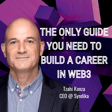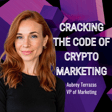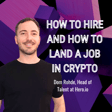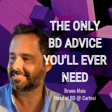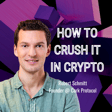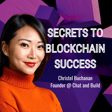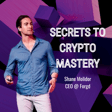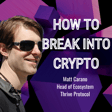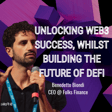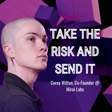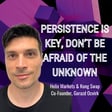Become a Creator today!Start creating today - Share your story with the world!
Start for free
00:00:00
00:00:01

Eric Lifson on Zulu Network, Bitcoin Innovation, and Building a Career in Blockchain
Dive into an electrifying conversation with Eric Lifson, co-founder of Zulu Network, as he unveils the future of Bitcoin beyond a store of value.
From transitioning from traditional marketing for giants like McDonald’s to pioneering in Web3, Eric shares hard-earned lessons on avoiding "ivory tower thinking," the power of deep human insights, and the pitfalls of assuming user needs.
Aspiring founders and Web3 enthusiasts will be captivated by his candid advice on breaking into the industry, building lean teams, and navigating the cyclical crypto market.
Transcript
Introduction and Eric's Background
00:00:01
Speaker
Eric, welcome to the show. How are Doing great. Thanks for having me on, Jack. Yeah, no problem. Thanks for joining me. Eric, for people who don't know who you are, could you give us bit of an introduction, please?
00:00:12
Speaker
Sure. My name is Eric, and I'm a co-founder of Zulu Network. um I've had an interesting journey through through this whole ah you know blockchain kind of thing.
00:00:24
Speaker
um I started originally from Canada. um And I used to work at the largest independent marketing consulting firm in in Canada.
00:00:36
Speaker
um And I started in you know, more traditional, um you know, marketing and strategy. And i started in, helped launch McCafe like across Canada.
00:00:50
Speaker
um I worked on a lot of things for McDonald's. um I worked on a lot of things for P&G, General Mills, and many other things over about seven or eight years.
Eric's Career Journey to Blockchain
00:01:01
Speaker
ah Then I decided to do my MBA. And I did my MBA. And as part of that, um You know, I had the incredible pleasure of of doing ah an exchange program in Shanghai, um you know, and being a and relatively you simple Canadian and things like that. and And, you know, experiencing the shock of, you know, coming to Asia for for a period of time and really, you know, um you know, ah really broadening horizons and things like that.
00:01:32
Speaker
um And then i and then i I went back to Canada, ah started a technology company, um and you know and then and they got into the into the crypto space.
00:01:42
Speaker
One of the things about me that you know some people say is like, I'm kind of the CSO, the Chief Simplicity Officer. um I'm able to take very, very complicated things um and you know help you know make them more digestible and easy to understand.
00:02:00
Speaker
um i pride myself, believe it or not, and this is it is' like it controversial, but I pride myself in actually not being very technical.
00:02:11
Speaker
um in a very technical space. We have a very strong tech team, we have all all these kind of things, but my my core you know ah course my core you know essence is that actually think one of the core, you know one of the the areas that crypto and blockchain itself needs to improve on is sometimes it's tech for the sake of tech.
00:02:35
Speaker
And I think that you know, one of the areas that it really needs um is we need to foster this idea of of, you know, letting people in and embracing it and having real adoption.
00:02:48
Speaker
And so, um you know, you need people like me.
Simplifying Blockchain for Broader Adoption
00:02:52
Speaker
I'm not on the cutting edge, you know, ready to go, the first person to download things. That's not who I am. i'm not I'm not too late either, but I'm on the, you know,
00:03:02
Speaker
middle or early in the curve, but you know, so the core thing is like, it's about how do you bring people in? How do you make it easy? How do you make it make it accessible? How do you make it fun? And, um and that's when it becomes interesting and it can truly change the world. So that's a bit about me.
00:03:19
Speaker
That's cool, man. Yeah, I think the space does overcomplicate a lot of their marketing and a lot of their language, right? It's very difficult if you're not techie, if you don't really understand the industry.
00:03:31
Speaker
It's difficult to pick up on what's going on, really, what you should be using, how you use stuff, how everything links together, how you can bridge one asset to from one chain to another. that is gets yeah It's difficult, complicated.
00:03:46
Speaker
Absolutely. And then, so obviously you, as you mentioned, you're a co-founder at
Zulu Network's Mission and Bitcoin's Utility
00:03:53
Speaker
Zulu. Could you give us a bit of ah a look into Zulu, what you guys do, the challenges you're solving?
00:03:59
Speaker
Yeah, that's good. Yeah, definitely. So I think fundamentally one of the biggest. um You know, narratives. Around Bitcoin, right? Bitcoin is is a completely like generational, like technological advancement.
00:04:17
Speaker
um That's really literally as we speak, reshaping the entire financial landscape. Right. um But. One of the misconceptions that we believe is that, um you know, the the the idea of, okay, you know, Bitcoin is this pure store of value.
00:04:38
Speaker
And it's kind of something you just, you know, need to hold on for and, you know, hope for the best um is is we think going to be become an outdated premise.
00:04:49
Speaker
And I'm here to say something very shocking to you.
00:04:54
Speaker
whilelthough Although he's a complete genius, Warren Buffett is wrong. Okay? He's one of the best investors of all time. But it's ah it's possible for really smart people to say things that are incorrect.
00:05:08
Speaker
And going back to 2018, Warren Buffett said, if you buy Bitcoin, you don't really have any interest in producing anything. You're just hoping the next guy pays more.
00:05:22
Speaker
He even used the endearing term rat poison or something like that. So, you know, there's that. I mean, a bunch of his companies now are buying Bitcoin.
00:05:32
Speaker
So that's another discussion. But, um you know, while he's a genius, one of the best investors of all time for Bitcoin, he's wrong. And fundamentally, Bitcoin is not just a passive asset.
00:05:45
Speaker
Bitcoin is not just gold, right? You can take a brick of gold, maybe you can you can do some jewelry with it or whatever, but you know this idea of taking a brick of gold and just leave it there and hope for the best. It's secure, it's decentralized, and it's programmable value. That's what Bitcoin is.
00:06:00
Speaker
and We fundamentally, our mission, our vision is to believe that Bitcoin can be so much more than a store of value. It can shift from this idea of pure store value, you know something you you know keep in a shoebox or keep you know under your bed kind of thing and hope for the best, like a trading card is something. No, this is something that can actually do things and and it work for you. It's not just pure passive and it's going to become a new value paradigm.
00:06:29
Speaker
OK. So it's really about powering the next ah you know, instances of of, let's say, commerce or things like that, um you know, with the power of this of this incredible network and asset.
00:06:46
Speaker
um And, you know, it's a we we believe it's about powering AI and Deppin with Bitcoin. And so the idea is that you can earn using your Bitcoin and other assets in an open, fun and powerful way.
00:07:02
Speaker
um And we see, you know, building this new economy um with Bitcoin finality, we already have our mainnet up. um And, you know, this idea of having this AI and depth and layer that's using the power of EVM.
00:07:17
Speaker
So it's so anybody can play, right? You know, Bitcoin is is is is great. But you know to do a transaction can cost a lot of money, like up to $100. And it can take 10 minutes or something like that. like Nobody has that kind of time.
00:07:32
Speaker
It's not really commercially viable. Yes, you it's okay if you wait 10 minutes for one transaction, but you can't do anything on it. So for us, it's all about how do we actually do things on this on this chain while leveraging this, I don't know, $1.5 or whatever, $1.3 trillion dollar asset today.
00:07:51
Speaker
um And you know that's where all the all of the the value is right now. So you know some people say, well, Ethereum is the testnet of crypto, and the real thing is still just Bitcoin.
Insights on User Growth and Market Challenges
00:08:03
Speaker
And so what we've done is we've we're we're making it so that it's programmable, so you can do things with this Bitcoin. um And, you know, power power AI, power Adepin, stake your assets and earn on Bitcoin.
00:08:17
Speaker
And so, you know, with making it so simple, i just connect your wallet, secure the stake to secure and earn not earned or but for Bitcoin. um And so, you know, we we think there's going to be so many amazing things that come with AI,
00:08:31
Speaker
and Bitcoin, right? You think, oh, they're two completely different things. No, they're not. Because we see, for example, the future like AI agents, models, dApps, assets, things like this.
00:08:42
Speaker
And how are all of these agents and all these things going to connect? how are they going to pay for things? Well, crypto crypto is is instantaneous. It's it's easily fractional. It's fractionalized. like it It's it it makes it just works.
00:08:57
Speaker
Right. So doing that while leveraging the the network effects and value of Bitcoin itself is just a no brainer for us. And so, you know, that's kind of a bit of background on on Zulu. And we think that by leveraging the power of you know,
00:09:13
Speaker
um you know and other things on top of Bitcoin and making it usable and and friendly and fun. We think that this is going to be a huge, huge area for excitement.
00:09:25
Speaker
um And that's that's about Zulu. Nice one. um Sounds cool. So you guys have been been around for a good few years now, right? Two, three? um One and a bit years. Maybe one, one and a half years. Yeah. Something like that.
00:09:40
Speaker
um Yeah. And, you know, then been growing pretty fast. I mean, we had like 700,000 people on our our test net. um it was it was It was quite strong. um You know, market is a bit shifty here and there. yeah it's funny So, you know, keeping everyone's attention is, is you know, for for long periods of times is up and down. But I mean, hey, it's it's it's it's great.
00:10:06
Speaker
Yeah, for sure. What you said there about... um obviously blockchain and and crypto like underpinning AI, you can see the merge is becoming more and more and more apparent. Like just today, I was signing up for all of the side events for token and ah in Dubai.
00:10:22
Speaker
Every other event is a AI times blockchain or AI and web three event. moon You can just see that much like happening more and more and more and more as as time goes on.
00:10:35
Speaker
um It's quite interesting. definitely I mean, it's the interesting to see what comes out of it. It's only natural. Yeah. Yeah, totally. There's going to be a lot of like garbage that comes out of it, to be honest, yeah but there's going to be a lot of amazing stuff that comes out of it too.
00:10:46
Speaker
And I think that, you know, it's, it's a really amazing time and, and it's pretty exciting to be honest. Sure. We need, you need the good stuff and the bad stuff, really. That's where you need people to try and build everything they possibly can. Cause that's how the innovation happens, right? Like there are going to be bad things in there and they're going to be rubbish stuff. But there's also going to be some amazing things that come out of it. Um, they need absolutely.
00:11:08
Speaker
Um, So over, ah taking it back to your your career, um you explained your your journey, you've worked with some huge brands ah before getting into Web3 and obviously you've been here for for a while now, you said like seven, eight years and obviously with co-launching Zulu over the last year and and a bit.
00:11:29
Speaker
You must have seen and come up against quite a lot of challenges during that time.
Importance of Genuine Consumer Insights
00:11:36
Speaker
Are there any that really stand out to you that were like your biggest learns, things that you really, maybe that surprised you or that you really learned from like throughout that journey?
00:11:46
Speaker
ah know there's probably tons, but are there any like key ones that but stand out? Absolutely. Absolutely. So going to, I'll say a general point and then I'll talk about specific examples from my previous ah work and from Zoom.
00:12:00
Speaker
Okay. um And it comes down to one key thing. If I can give advice on anything, if anybody is listening to this and listening for for for advice on what to do with your career, what to do if you're having a startup, what to do, whatever. And it is about listening true insights.
00:12:26
Speaker
Okay, what do I mean by this? Now, that sounds like, okay, sure, whatever, I get it. But this is so much bigger than that. All right. Let me tell you something. Most people lie.
00:12:41
Speaker
Okay, and I don't mean in ah in a way that's malicious. I don't mean it in a way that's, you know, oh, like, they're purposely lying. No.
00:12:54
Speaker
People lie every day to themselves. They lie about a lot of things. And, you know, you know, if you, if you want to do something great, whether you're in marketing, whether you're in, you know, ah you're building a company, whether you're doing whatever, we have to peel away the layers and we have to truly get to the deep human insights.
00:13:20
Speaker
And what one of the biggest learnings that I've had is that when you When you, you know, I call this kind of ivory tower thinking. i don't know you've ever heard of that term. Have you heard that term before?
00:13:33
Speaker
Well, when you're in your ivory tower, it's like you're this, you're, you think you know everything and you're like up on a high and you look down at the people and you say, oh, I think it's this.
00:13:47
Speaker
So when you're thinking about an idea, you're thinking about a business, you're thinking about a marketing strategy of how to tell people about what you're doing, right? the worst thing you can do is ivory tower thinking.
00:14:00
Speaker
Okay. Means you're just assuming things you're like, Oh, I think they're going to like this because that's it. Right? No, that is, that is the worst thing you can do.
00:14:11
Speaker
All right. In fact, It goes way beyond just, you know, like how do you market something? It's should I even do this thing or not? Should I even do this project? Should I even do this company?
00:14:25
Speaker
Right? That is the most important thing you can learn. Now, let me give two specific examples so that you can get a good flavor or sense from this. The first I'm going to tell you is from my experience doing strategic planning for McDonald's.
00:14:40
Speaker
Okay? So i I worked with McDonald's for about seven years or eight years and i you know, this was closer to the two earlier to, you know, when they did like super size me and like there was and a lot of a lot of like.
00:14:58
Speaker
You know, bad backlash about health concerns for McDonald's. Okay. um And so. I, I, you know, one of the things that I was tasked with was understanding and gaining insights.
00:15:13
Speaker
For about salads for McDonald's so, you know, so we were planning to do a big salad lunch. All right. And, you know.
00:15:23
Speaker
we went all around canada we we met with a bunch of different people uh specifically women in in the target demographic and we would go around and meet with them and talk with them and get their true insights on salads okay um and you know you know people would say a lot of things right if you talked on a very surface level they'd say oh and i want you know very crunchy proteins in my salad i want this i want this but they would just, they would, they would lie, right?
00:15:56
Speaker
They would, they would they would say things all the time that were just like very, you know, surface level. And it wasn't believable, even then to themselves. They're like oh I'm just going to get a salad.
00:16:07
Speaker
How many times do you say that? Even, you know, everyone wants to stay fit. Everyone wants to whatever. It's like, just going to get a salad. But yes. So, so I remember one woman stood up in the middle of the, of the thing. And she said, get a salad at McDonald's.
00:16:22
Speaker
She said, I'm not getting a salad at McDonald's. When I go to McDonald's, I want to get dirty. That was her words. I want a burger. I want greasy French fries. I want to dip it in ketchup. I want to eat it. You know what mean?
00:16:37
Speaker
That's a real insight. that everyone Everyone was like so polite. Everyone was like, yes, I i like you know i'm protein on my salad. I like this. You're at McDonald's, right?
00:16:49
Speaker
why are you at McDonald's? Your kid wants a happy meal. You want this, like you're, you're not thinking like that. Right. So she was very honest. That's a real insight. and Okay.
00:17:00
Speaker
Now let me give you another example for Zulu. Okay. So I, one of, one of the things that we, we, we assumed, to remember, you know like kids will say this, like if you assume you make an ass of you and me, yeah,
00:17:16
Speaker
So this is go back. we were we were guilty of having, you know, ah ivory tower thinking. Right. So. At the beginning, we're thinking, OK, maybe we want to have some kind of, ah you know, P.O.W. like proof of work aspect and really target a lot of miners for this for for like kind of Bitcoin layer two.
00:17:40
Speaker
Right. While a lot of miners, they're going to support it, they're going to do a lot of things. Sure, that was our assumption. all right We went to Nashville, you know like the big Nashville conference okay um last year, and where President Trump spoke and it was this whole thing.
00:17:56
Speaker
right And on the side, I'll never forget this very similar to my let's get dirty comment. There's another one of those like deep because because once again, if you talk to a lot of people, they're going to give you this kind of like call it like mom's apple pie.
00:18:12
Speaker
Right. Was mom's apple pie. It's basically something that's like sweet. It's yummy, but it's not there's no nutritional value it's just like it's just like you know you just get you know you hear it you want it okay great right you can have different cultural references to that but you know it's just like something that just like you just you just want to hear it right And and I think that like one of the so so we had this conversation with one of the biggest mining companies in the world. Okay. They're based in the US.
00:18:46
Speaker
We met with them and I'll never forget this. We met with this lady. She she was very, like very prominent in the mining industry. Okay. And we sit down with her, we say, OK, so know what are we, what are we, like how, like we're very, you know, we're coming in like a little, not saying cocky, but a little bit like, hey, like how do we get you into this, this thing? Like, what are we going to do to you know, get you on board with the mining, ah get get your mining stuff on board? And let's like, you know, Bitcoin layer two is going to be huge. And like, let's, let's do that.
00:19:16
Speaker
OK. And she was like, we we had actually hung out for like one or two days. um Like our team, her, like things like that. And like we'd we'd we developed a rapport. So it wasn't just like some ah first meeting, ah you know, whatever. So she was comfortable to be very honest with us.
00:19:36
Speaker
And what she said was she said, I will never support you guys. We're like, whoa, why? Right. She says, how do I make money?
00:19:48
Speaker
How does a miner make money? A miner makes money from Bitcoin transactions. Right? I mean, very, very simple. A Bitcoin miner makes Bitcoin money from Bitcoin transactions.
00:20:01
Speaker
If you guys are trying to help scale or make it more cost efficient, how is that good for mining? She's like, I make millions and millions of dollars.
00:20:12
Speaker
or tens or even maybe even billions of dollars from Bitcoin price going up. And if you saw, you know, if you saw, you know, ordinals, remember ordinals, like ah all these things like rune stones, like these things were driven, they actually drove up network, you know, activity for Bitcoin, right?
00:20:34
Speaker
um And that was actually one of that one of the things that actually got us to start this thing was like, okay, we need to have more transactions and like scalability for Bitcoin. But that's an incorrect assumption yeah when it regards to miners, because as I said, day they're like, you you're it's like, even if yes ah a layer two is super successful, right?
00:21:01
Speaker
It goes to finance. Let's say it goes to like a huge, you get a ton of users. You're actually cannibalizing my core business, which is Bitcoin mining. So why would i support cannibalizing my business when my business is already very good and I'm just getting Bitcoin as a store of value?
00:21:22
Speaker
ah wouldn't but So that's one of those. We wouldn't. Right. So that's one of those moments where like, oh, OK. And and we we really appreciated her honesty, but it was like, you can't.
00:21:35
Speaker
So yep my biggest piece of advice for anybody, it doesn't matter really what industry you're in. If you want to start a business, if you want to get into market, if you want to do whatever, i mean, marketing is a part
Entrepreneurial Advice: Perseverance and Adaptability
00:21:47
Speaker
of everything, right? you You, even if you're a doctor, you still need marketing. you need people to trust you, trust your advice, right? You still need to, I mean, in some ways sell what you're doing, right?
00:21:58
Speaker
so You need credibility. So fundamentally, right? The biggest piece of advice I can give is do not assume things and do not just take things at face value from people.
00:22:14
Speaker
Okay. Because ah it's not malicious, right? yeah Even for example, you can look yeah we can take some piece of data and we can skim it over like five different ways and tell five different stories.
00:22:26
Speaker
Right. but it's not gonna give you real data. And that comes from actually talking to people. yeah Get out of, you know, most people today when they work, they just just only work on their laptop, right?
00:22:38
Speaker
They just, it's like, it's like you have this firsthand information, right? Then you have second hand information, which is like, you know, some analysis of something and third hand information, just like, you know, you Google it, you just get some chart, but that's it's, and it still can be useful, but it's still so far away from, you know, the real deep human understanding and in and and insight that can spark an aha moment.
00:23:10
Speaker
If, if you have that special moment, like when, for example, you're talking to a lot of like entrepreneurs, right. Or, or, or people who want to become entrepreneurs.
00:23:22
Speaker
If you don't have that magic moment, you don't feel that spark. If you don't, whatever any business, any startup requires like five plus years or whatever of work, right. If you don't have that magic spark.
00:23:35
Speaker
and you don't have that how moment then keep looking at for it or stop that's my advice right it's good about because because ah most people as i said give you mom's advice like oh just keep going you can do it it's all good but that's actually not good advice yeah that's i suppose people people say that because it's It's not to be malicious. If anything, it's the other the opposite.
00:24:02
Speaker
They don't want to necessarily hurt you. You're trying to like trying to be polite. and trying to Trying to give you the support that you want. But that's quite difficult to get to the get to the real truth.
00:24:14
Speaker
of what people want right i guess you almost have to try and and what just try and get that uh get that information anonymously like maybe as part of a wider group so that people are a little bit more comfortable to give it to you do you go to your peers actually you do trust to give you be the advice you think that yeah which is it's a good question i think I think people in general are actually very you know people are very nice in general and like they're open to talking, but you need to do it in a way that that they're comfortable really telling you the truth.
00:24:49
Speaker
um If you're just asking them like just one off or whatever, like but one of one of the things that's like really powerful is this idea, like and I think we don't necessarily do it enough, is this idea of like ethnographies or like just one like just like focus groups or even just one-on-one meetings.
00:25:07
Speaker
right like i think I think that there's a richness to that and it's time consuming. But if you really... know like Most of the time actually, what you do is not as important as who you are talking to. you know When you say you need to really target your target, if you truly understand your target,
00:25:29
Speaker
You need to know what like makes them, keeps them up at night. you need to know what's like but's truly motivating them. If you don't understand that, then don't do what you're doing. like you're you're You're just going to spin your wheels and just assume a lot of things.
00:25:44
Speaker
Maybe you know you might might get lucky once in a while, but you really need to understand what they're looking for. And that's that's that's the lesson. That's the key thing. That's a good lesson.
00:25:56
Speaker
listening but listening in a very like probing way yeah that's a good skill to try and ah try and learn as a founder like one of the questions i was going to ask you is if you could give us a bit of a crash course on what makes a successful founder as you just talked to there the ability to really understand your target audience audience, understand the problem that you're really trying to solve, make sure it is a problem, make sure it is something that people want it to be solved. I guess you've kind of touched on it there, but I guess, yeah, that's ah that's got to be a key skill, right? For any any founder, any successful founder, you have to be able to get to the bottom of your target audience and really understand what they want.
00:26:42
Speaker
yeah If you truly understand what they want, then the problem will be flashing as and as like bright as day. and your so And then you can truly test your solution.
00:26:54
Speaker
And you should also, as a founder, a lot of the times people overcomplicate things. You you should come up with like quick ways to test it. and and and challenge your assumptions before you do a lot of work, before you like, okay, I'm gonna go do this PowerPoint, I'm gonna go do this, I'm gonna go do this, actually just go and talk to people.
00:27:14
Speaker
And you might be wrong on your target. You might be wrong on the offer, you might whatever. But if you don't go out and actually talk to people, you'll never get the real scoop.
00:27:25
Speaker
For sure. And just on that as well, I guess something else that might, or is very useful
00:27:34
Speaker
if you do want to be a successful founder is then the flexibility to be able to not have your ego bruised in that situation because I can imagine it's you've come up with this amazing idea and you go out to the market as you you spoke to your contact in in the mining industry and you thought this project is going to be amazing you go right we've got it we go pitch them and they go nah we don't want it it's not interesting it's not for us I guess the ability to be flexible and think well okay so who who is our target audience, who are we going to go after, like, how are we going to change up the project?
00:28:07
Speaker
Having that flexibility, I think is another key skill, right? And if you don't have that, i think that's quite difficult. ah It's difficult to be a founder if you don't have that level of ah flexibility, really.
00:28:21
Speaker
Yeah. And I'm going to say something and I'm also going to contradict myself. So number one is you need to have grit and resolve. ah you need to be You need to be comfortable having doors shut in your face.
00:28:36
Speaker
However, also going back to what I said, you need to also challenge your assumptions before thinking giving that resolve.
00:28:50
Speaker
Because If you're just having resolve it, so I'm going to do this no matter what, you will have you will be myopic, you will have your blinders on, and you will not truly be able to get the real insights.
00:29:03
Speaker
But if you feel, okay, I've really uncovered this ahha mau aha moment, then go for it. And Also, drown out the noise.
00:29:15
Speaker
This is another big piece of advice. There's so much noise from people. The number one question you should ask yourself when somebody is giving you advice, have they done what I want to do?
00:29:28
Speaker
OK, have they actually like have they actually accomplished what I want to accomplish? For example, most people, you know, you can do a startup, do a startup, say, oh, I want to do I want to make the startup worth, you know, one hundred million dollars or whatever it is. OK, if someone is giving you advice, listen to them.
00:29:47
Speaker
Sure. But take it with a grain of salt. Like, did they did they reach this goal already? Did they reach something similar to what you're trying to do? And if the answer is no, oh, they're they're a teacher or they're this, like, then don't listen to them.
00:30:00
Speaker
Like their their opinion is literally irrelevant, um you know, or do exactly the opposite of what they're telling you to do.
Recruitment Strategies in Web3 Industry
00:30:07
Speaker
Because it's just like, you know, it's like it's like empty.
00:30:15
Speaker
what what What is that? So listen to them, filter them. Sometimes there might be something interesting or thread or something like that. Don't be arrogant, but but you know if they have nothing to do with what you're doing or what you want to do, then don't listen to them.
00:30:33
Speaker
it's just It's just noise. right And so there's so many inputs and noise and things like this. Oh, this other project just did that thing or whatever. And people will say oh, we need to change our our strategy. We should do this No.
00:30:45
Speaker
like just just drown out the noise focus on what you want to do and if you have that at home moment and you see okay there's a clear market for this there's a clear this there's a clear this and we have you know great potential distribution or whatever it is then go for it yeah you're right it reminds me a bit of when i uh when i launched in veil actually because i only recruit uh into the web3 space and i was saying that as a There's a real talent shortage in Web3 and a lot of projects do find it some some don't, but some some majority of projects find it pretty difficult to find the right the right type of people.
00:31:21
Speaker
And when I was when I was launching the agency and I was saying to friends and family and stuff, I just want to focus purely on Web3 blockchain recruitment. Everyone's going, oh, I don't know if you should do that.
00:31:34
Speaker
Is that something you should really look at? Is Web3 a scam? Yeah, like this kind of stuff. Yeah. yeah like this kind of yeah But you knew better that because you were the one in the industry. you you were you were You were talking to people. You had the insight. and You had this whatever.
00:31:49
Speaker
And you saw that you saw the opportunity before other people saw it. that that's That's what I'm talking about. you know you you you you If you talk to like 10 different companies, you're like, oh, I can't find anybody to for this XYZ role. It's like, well, I know people. I can help you find that.
00:32:06
Speaker
They're like, OK, well, let's go. like If you have that, then then you have the insight. You have it. right yeah and that's yeah as you as you mentioned there like if i'd have if i'd have taken the advice from people who haven't launched recruitment businesses or who don't work in the industry don't really understand the the problem that you're trying to solve i'd have never i'd have never started it and this is like three years three years later um going well uh and you just think well if i'd have actually listened to to those people who knows i might still be
00:32:37
Speaker
don't know might still be employed working in in a recruitment business in web 2 recruitment for i don't know insurance businesses or something who like who knows you don't know where you'd be right um you're completely right exactly you right on that um talking of of kind of joining the industry and and working in the industry i speak to a lot of people who want to break into the space Is there anything that you really want people to be at aware of or anything you think people should be aware of before joining the industry?
00:33:13
Speaker
Yeah, I would just say, and it's very simple, but make sure. So two things. Number one, once again, I'm going to repeat what I already said, which is make sure that there is a clear need for something.
00:33:27
Speaker
And I don't just mean like, oh, you read like a blog or you read like actually talk to people that clearly need something. Do not create a so a solution for a problem that doesn't exist.
00:33:40
Speaker
we its It's not good. OK, this is what I'm talking about with, you know, ah from the beginning, you know, in terms of like. You know, so a lot of infrastructure, a lot of things like that. It's just like, oh, we need to like we have better TPS, which is like transaction per second or we're we're faster, we're better. Like, who cares?
00:34:00
Speaker
It really doesn't matter. um it It's really about it's really about like how do you bring users on? How do you actually grow and how do you solve problems? And I would say 90 something percent.
00:34:17
Speaker
90-70% of any crypto project is actually useless. um you know it's it's it's It's a bit harsh, but haven't most I would say most crypto projects have not actually solved any problems.
00:34:33
Speaker
They've just created technology for other things. um except for this I think I call casino fi, which is basically like just, just things you can gamble on.
00:34:44
Speaker
And I think that the market is starting to mature a bit. I think it's, I think there was this whole wave of meme coins early in this cycle. And, and I think that people are kind of just getting tired of it.
00:34:57
Speaker
Honestly, I think there's a fatigue going on. um And and like I think that the idea is, like can you do something that people actually want?
00:35:10
Speaker
Okay? and and ah And I think if you ask that question and you can genuinely answer it,
00:35:18
Speaker
and you can and you can add value in that capacity, then the answer is, of course you can break into the
Active Engagement in the Blockchain Space
00:35:25
Speaker
industry. And remember, as someone who is not technical, I'm not ah i'm not a developer, right?
00:35:31
Speaker
my My skill set of being able to talk and clearly convey you know um you know complicated things in a simple way is valuable, okay?
00:35:43
Speaker
It's valuable, marketing is valuable. You need to be able to communicate with people, all right, and express your value. So, but fundamentally, that's all well and good. But if you can't actually solve a real problem, then all really it is is just like pump and dump garbage.
00:36:03
Speaker
Really. I mean, how many how many pictures of dogs do we need? we just We just don't need that many. and And so I was real something like, i don't know, there's there's millions and millions, and maybe 10 million tokens now or something.
00:36:16
Speaker
I forget the exact number, but like it's it's astonishing. Like if you look at Pump.Fun, I mean i you know have opinions on that, but if you look at Pump.Fun, like there's like 100,000 tokens coming in a day or something. like Like what's the value of these things? There's nothing.
00:36:31
Speaker
and she's Just literally nothing. That's just gambling there, right? So yeah. tapping into people's needs to gamble or want to gamble that kind of game gaming yeah side and i mean that that is a need that is a need that is a deep insight right and maybe that is what people want but you know The question is, if you want to get into this industry, what problem are you solving? whether you're Whether it's for yourself, like, oh, I can solve this problem because I can add this value.
00:37:01
Speaker
Or if you're a project you're founder, what value can you actually solve? And that's a hard that's a really hard question. Because unless you're like unless you're you know doing something like with, like for example, RWA tokenization or things like this, like most most of this stuff is just is is just like gambling.
00:37:23
Speaker
That's why like yep Zulu is building on Bitcoin itself and trying to actually you know create native Bitcoin yield, which is a very crazy concept. Because Bitcoin does not actually add new tokens.
00:37:37
Speaker
Like it doesn't have inflation. So you need to really come up with like, that's why we're working with like AI and Deppin and things like this, where it's like, you can actually do things on top of it beyond just like speculating on the next new coin.
00:37:50
Speaker
And what if, what if um but if someone on ah isn't coming in the space to, to launch a project or to found a project to solve a particular problem? What if they love blockchain, they love the look of the industry, they want to get their first job in Web3 blockchain?
00:38:10
Speaker
Is there anything that you'd want them to be aware of before ah joining the industry?
00:38:18
Speaker
i think um I think the core thing is you need to um You need to have the ability to play, okay?
00:38:30
Speaker
I wouldn't hire anybody who is not actively trying to be in space. i don't I'm not going to judge somebody that is new to this space.
00:38:42
Speaker
I'm not going to judge people if they don't have a lot of knowledge in the space. That's fine. We all start from somewhere, okay? Where i'm not going to to you know I'm not going to be lenient on is if people are just kind of only reading things or just like, I want to get into blockchain.
00:39:01
Speaker
And you ask, why do you want to get into blockchain? Oh, I want to get into crypto. Why do you want to get into crypto? i want to make money. Okay, sure. That's a byproduct. All right. Making money is a byproduct.
00:39:12
Speaker
The core thing is... how do you How do you add value? And you this is still a very early stage industry.
00:39:24
Speaker
okay You have to change your expectations. you have to change your thinking. The core thing is is that you need it's like a sandbox.
00:39:36
Speaker
so mean That's why people call these things projects. They're not companies. They're projects. They're literally experiments. I mean, that's what this thing is about. So you need to have that playful spirit. And the number one thing would advise is you don't need to spend big money, right?
00:39:55
Speaker
But if somebody is coming to me and they want to like work on our team or if they want to work in the industry or they want to do their own project, the first thing I would ask them is, like have you actually played with anything?
00:40:06
Speaker
and And you'd be surprised, right? like You'd be surprised. They'd say, oh, I want to get into blockchain. Or they'd give a very academic answer. This is in some ways kind of like a kinetic industry in that you need to like do things, you need to break things, you need to you need to try different things.
00:40:22
Speaker
And you know going back, you know like for example, like in the DeFi era, right like
00:40:28
Speaker
If you didn't take like 10, okay, to take $10 and go play with these things. Like, I'm not saying go take all your money and like gamble and go be wild, but go buy an NFT, go go trade things, go go stake something, go do something.
00:40:42
Speaker
If you can't do that and you can't figure that out, then you should not be in this industry fundamentally. Like you should just you should just literally not. um Because you need to be like there's a creative destruction. you need to be able to like try and play and break things and and mess around.
00:41:01
Speaker
If you don't have that playful spirit, you can't create this thing. Okay, then just wait two to five years when blockchain is something that's, you know, very mainstream.
00:41:12
Speaker
And it's not like it's like when you use Facebook, right? or you use like a big, like a, you know, an app, like WhatsApp or whatever, you don't ask like more in a second, which protocol is this built on?
00:41:23
Speaker
Like what's the DNS servers? Nobody talks like that. They're hey, send me a file. Let me send it. Let me send you a message. Nobody like that's, that's, that's a real life person. Like that's how they talk, right? and They don't, they don't talk in this technological jargon, right?
00:41:37
Speaker
So, um but if you, in the meantime, while we're bridging that gap, okay, If you want to get into the blockchain space, you need to be able to play and mess around and break things.
00:41:54
Speaker
That's my big idea. You're right. The amount of people that I interview and speak to, let's say they want to get into the space. and I'm like, oh, cool. like Have you read got a wallet? like What's your favorite ecosystem?
00:42:06
Speaker
They're like, no, I don't want to put my own money here because it's too risky. I'm like, well, you probably shouldn't. And then I would i would immediately say you should not be in the industry. and And like, what we're saying, like, not put your money, like, if you're if you're if you can't put, like, the price of, like, I'm i'm not talking, once again, I'm not talking, like, thousands of dollars. saying if you can't like, the price of a coffee,
00:42:28
Speaker
into, into this, into messing around saying like, yeah you know I played with, I played with Solana. I played with this. I tried this. I just, okay, I will talk to you. Right. Like there's something there. Like you put some effort, you tried things.
00:42:42
Speaker
If you can't do that, like, like what are we doing? You just, you just want to make some money. lot of easier industries you can go into to just make some money. Right. Yeah. So what if someone was trying uh,
00:42:54
Speaker
ah get their first job in the industry. Can you give someone some advice on on that? Yeah,
00:43:04
Speaker
yeah I would give two pieces of advice. Number one, it's very hard. Okay. So, you know, how did I get my first job? Well, what I did, going back to my my time like at the strategic planning firm for it that worked with McDonald's, I literally, like it was 2009, nobody was like hiring anybody.
Contributing Value in Web3 and Career Building
00:43:26
Speaker
And I'm like, okay, the biggest you know client of this company is is McDonald's. So I went around a, you know as think was like early 20s or something.
00:43:39
Speaker
And i was I went around and I said, I studied and through my research. I said, okay, what's the biggest opportunity or focus for McDonald's from a business perspective? At that time, it was breakfast.
00:43:51
Speaker
Breakfast was the but hot day at that time. Okay. And I think I even read in like an annual report or something like, we're going to focus on breakfast. So I wasn't, it's going back to that insight. Like I wasn't just like talking out of my ass.
00:44:06
Speaker
Okay. So then what I did was actually went around um and went to like 10 different restaurants and, you know, interviewed people and created a video of me interviewing people and getting insights around breakfast.
00:44:21
Speaker
So it's like, I want this, I want this, I want this. And this, what once again, I'm a kid, I, i you know, and whatever. But like, I put this video together, i i gave it to them, and it went like viral in the sense that like, you know, 30 people like were looking at it or whatever, and they're just like, get this kid in, let's go, right?
00:44:41
Speaker
you You have, that that's what I'm talking about, by playing. You need to like, you can't just like sit on your computer and like, Oh, I saw like crypto is good. Like, no, that's not good. You need to like get your hands dirty, go talk to people, go to events, meet with people, talk to them um and then ask yourself what what's what's in it for them.
00:45:05
Speaker
Don't don't worry don't. If if you can add value and you can help people and you can say, i can help you with this. ah you know they might say oh we're not hiring right now it's like hey that's okay what if i spent one month if you have the financial wherewithal right what if i spent one month and i can actually build this thing for you or i can i can help you manage your social media or i can help you whatever whatever like find figure out what's what's you know what's keeping them at night up at night what's what's going to help what's what are they looking for right
00:45:38
Speaker
Because, you know, if they for like at the beginning, ask them just directly ask them, like what, what, what's important for you? What are some of your challenges? what do you think? And let them tell you their pain points.
00:45:49
Speaker
And then think about how can I solve the payments? At the end of the day, most people can only do the same, you know, especially entry level. Most people have but at the same level of skill. It's not about the skill, right?
00:46:02
Speaker
It's about how do I feel around this person that I'm hiring? Right. You know, people, a lot of people like the thing is like when they hire, when they, when they vote for a president, it's like, you know,
00:46:15
Speaker
do I wanna have a beer with this guy? but It's not about like the job that they're doing. It's about, you know do I like this person? Do I wanna hang out with them? right And I think that that's, you know being likable and being able to solve problems is very, very valuable. So if you can say like, hey, hey you know I looked at your looked at your website, um I noticed if you don't mind,
00:46:41
Speaker
I came up with, you know, five or 10 ideas of how I think we can, we can improve things for you guys. um And he said, that's nice. Like, but I don't know, whatever. He's like, and I'm going to implement two or three of them for you.
00:46:53
Speaker
You don't have to, you don't do anything for me. Like, like, for example, we have this, we have this guy who's like a community member in Zulu. All right. He's, he's from Nigeria. Okay.
00:47:04
Speaker
I've never met this guy. but But he he just loved our project so much that he's he literally just said, like, I'm going to become an evangelist for this project.
00:47:15
Speaker
Can I do meetups?
00:47:18
Speaker
I mean, we we pay him like ah like guess like a pretty small amount of money but like you know to help with some of these meetups and things like this. But I'm i'm i'm very impressed. I think we did a couple of tweets about it. like he's He's got groups of people. he's he's He's even just going through the PowerPoint that that I did.
00:47:37
Speaker
But like, he just, he's just telling everybody about Zulu and he's doing like, it's, it's great. Like that's value added. He, I never like was looking for someone to do that.
00:47:48
Speaker
He said, Oh, I think I can add value. Here's how I can do it. And he created his own job.
00:47:56
Speaker
And he's helping us. He's doing, he's in the community. He's doing a lot of things. That's, that's value. There's very few industries where you can create your own jobs. And I think Web3 blockchain is definitely one of them.
00:48:09
Speaker
If you can show that you can add value, that says yeah and there's tons of ways you can do it. Like Web3 needs everyone. It needs marketing. It needs community. They need HR. It needs recruitment. It needs engineers. It needs absolutely everything that you need in a traditional like Web 2 company, you will at some point, depending on the size of the business, need ah need it in in Web 3.
00:48:35
Speaker
So I think you can add value in in any um any area, really, ah of a project.
00:48:44
Speaker
um I guess the tricky thing is getting in front of people to have those conversations, right? Depending on where you're based in the world, it's easier than in some places than in others. You know, there's maybe a lot more meetups in other countries to be able to get into ah in front of front of founders, in front of people running projects and that kind of thing.
00:49:04
Speaker
um But I think it's about reaching out to people in the right kind of way. I get a lot of spammy DMs. I'm sure you do as well, man, like tons, tons of them.
00:49:16
Speaker
Yeah. Yeah. But the people who really take the time and make the effort to write something that is actually relevant to what you do, they may have like read something and they mentioned a particular tweet you've done or bit of content you created or a particular bit of news about the project or whatever it might be. like It's about creating that that relevancy to then earn the right to like have that conversation with.
00:49:45
Speaker
um yeah it's difficult polling it's difficult if you're reaching out for the first time and it's not something you've ever done before or anything like that it's quite a quite a daunting thing just to reach out to bunch of founders on the internet the the best advice the best advice i'd give for that is is this idea of like informational interview don't know if you're familiar with that concept But this idea of like, like hey, i want can i like I know you're really busy, you're whatever, you know i definitely look up to you. i would love to like take you out for coffee and I want to pick your brain.
00:50:20
Speaker
And then as you ask them some questions about the industry and then kind of subtly pump yourself up a little bit and then show what value you can do by the end based on your research of what they're looking for.
00:50:34
Speaker
So you kind of quietly let them know about yourself, but also learn about what they're looking for in in the interview. I like that. That's good advice. um um And what about if someone is already in the industry?
00:50:47
Speaker
They're working here and they may be working in one of your teams or, you know, in another, another founder's team and stuff. How can someone try and build a successful career for themselves in Web3?
00:51:03
Speaker
Yeah, the key thing is it's really about adding real value for projects. And, you know, it comes down to, you know, and anybody can can just, if you're looking like nine to five kind of job, like, oh, I'll do this function for you. Sure, that's fine.
00:51:20
Speaker
if you actually want to succeed and and do well in the space, you to ask like, what, what can I contribute? What can I actually do? That's, that's going to genuinely help this product because projects are very hard. You need to like really, you know, you really need to have the community itself, you know, genuinely contributing for, for the project and people need to be incentivized. They need to be able to do things um and build.
00:51:48
Speaker
And I think that like, as long as you have a clear value uh value proposition for yourself as well not just for the protocol uh like i'm gonna do this for you i'm good at this thing then then they' then it's great otherwise like it's very it's gonna be a challenge yeah for sure um and say yeah uh say for founders and launched their project they've raised the money they're now looking to scale their team can you so share some rev advice on how someone can hire the right talent for their project how do you find people what process it's a good question it's good question uh going to say two things and in terms of like the criteria number one is um frankly if if they're unless it's for an entry if it's for entry level maybe it's okay
00:52:43
Speaker
But in general, I would say actually one of the biggest mistakes you can
Hiring Challenges in Web3
00:52:48
Speaker
do is hiring people that are not, that have no experience and in the web three. um And that's that's challenging, right? Like that's probably why you have well you have a ah business because if people are like, well, I can just learn and I'll figure it out. Like, no, you you really can't just do that. It's not it's not easy.
00:53:06
Speaker
You need to truly understand like, you're you're you know if you're doing it like a web 3 business in some ways if especially if there's like a token like your core business is not necessarily about building a product it's there's the token component there's the the value there's the community there's all these elements that are really important and you can't just like say oh i'll just use my like you know web 2 skill set and do that
00:53:36
Speaker
It goes back to what I said before, if they're not actively playing within the space, as I said, it doesn't have to be for big money, but if they don't have a wallet, if they don't if they don't play, if they don't say, oh, if they can't tell you new things that are happening in the industry before even you know it, then you don't want those kind of people on your team.
00:53:53
Speaker
those That's number one. Number two, another big, big thing to consider is that this market is very cyclical. Okay. And we all see, you know, the the, the, the, the having cycle and things like that. And having been in this industry for seven or eight years, mean, my third, a third cycle already.
00:54:15
Speaker
And, you know, there's, it's feast or famine, right? So when you're scaling and building up a team, you need, to you need to make sure that your team is is going to be like great in feast and in famine.
00:54:30
Speaker
um and you know if there's if there's tough times like you know i mean let's be honest like when when you look at scaling and scaling up and down teams like the crypto has very is not stable right like not so you know like my first like you know project we had 50 people on our team right like grew You know, but that's it's too bloated.
00:54:57
Speaker
And then when the market's bad, you can't have that many people on your team. You need to be more nimble. So. You know, I think you need you need to have like some really, really good people on your team, like.
00:55:11
Speaker
Quality over quantity. That's really, really important because, you know, 10 just okay people, especially if they don't have experience in Web 3 are not even worth one good person.
00:55:26
Speaker
um You know, a lot of the top protocols, a lot of the top people, they really only have like five key people. And it comes back to philosophy, any really good high functioning team should only have enough people to basically like fit into a taxi or or or a pizza, like to eat, to share a pizza.
00:55:50
Speaker
Like if you're, if you're having more than like five or six people and like in like active decision-making roles, it's, it's a challenge. Like it's hard to do anything.
00:56:01
Speaker
So yeah, that's that's my big advice. um and And in terms of sources and things like that, as your to your question, like I care more about the philosophy and the thinking but of people than where they come from.
00:56:18
Speaker
um I can, I can, I, you know, I've hired people from recruiters, i've hired people from, you know, people just go up come up to us in a booth, like we're at we're at a booth and they talk us, but you can see they're passionate about it.
00:56:29
Speaker
You know, um that's like, you know, well yeah like Once I had like this kind of fan from Telegram and he just introduced himself and then we became friends and like also like worked a lot together over a long period of time because he just was so passionate about it.
00:56:51
Speaker
And I think that that's like that's that's something, it's like they can tell you something that you didn't know about the industry and that's going to be very powerful. Yeah, that's cool. I think as well, if you're a founder and you're trying to scale your teams, or even if hiring managers, you're not necessarily the founder, just if you're growing and scaling teams, I think it's super important to try and speak to other peers in the industry to keep growing your own network because embed the best hires you'll ever make will come through referrals through your own network hands down um yes you might you might be able to find some if you don't have a network obviously that's why people like me exist and then you can reach out to recruiters right but i think if
00:57:32
Speaker
um if you're trying to find those best people, those five key hires, as you said, the people to share the pizza with, you know, I think you've got to be hitting up your network, like who else you know in the industry, which founders you know, like who's the best engineer they've ever worked with that they'd recommend you have chat with, who's the best head of marketing. I mean, I would actually disagree with that.
00:57:53
Speaker
I would disagree with that. The reason is but if they if they're so great, they're not going to let them go. Right. um Like if they're that great, they're going bring them to their next venture. and And if it's a founder that you admire and you really want that, you know, you're very close with whatever, like, why would they give them up?
00:58:13
Speaker
um I would say like, you really need to like,
00:58:19
Speaker
this is still a pretty decentralized space. so So just going into your network, unless you're like super deep and you've been for a long time, like I've been in this space for a long time and I don't think I could just like go ask people that I know like, oh, who do you, like maybe once in a while, but like, I just don't think like they they would say like, oh you know, there's this or this specific person.
00:58:42
Speaker
I think, you know, it's in that moment. like And then that's exactly why someone like you exists, right? Like like you're your's you're your agency, right? So yeah.
00:58:54
Speaker
Interesting. Yeah, I think, um I don't know. I think i think you would find, i think you'd be surprised if you've asked maybe if you asked us friends, people you know in the industry that, you know, we're looking to scale the teams, we're looking for these these types of roles, like who can you recommend? I reckon you get some pretty good recommendations.
00:59:14
Speaker
Maybe. I always advise before even speaking to me or speaking to a recruiter to exhaust your own network first. Save your cash for one. You don't need to paying agency fees if you can fill the roles yourself.
00:59:24
Speaker
Yeah, I mean, that makes sense. that makes sense that um But then you get that. I guess almost like a seal of approval, like people that you trust recommend these people and that kind of thing. Like
Conclusion and Encouragement to Engage with Zulu Network
00:59:34
Speaker
it's always an avenue to explore first, whether or not you get anyone, I guess is a different story, but it's definitely worth exploring first, I think.
00:59:40
Speaker
um Yeah. I think it's also important to know really what you want from the role. Yeah. Great. Yeah. That's important for sure. Yeah. A hundred percent. um Nice. So and to eric to to finish up, there's, there's one question that I like to ask everyone ah who who comes on the show.
00:59:59
Speaker
Knowing what you know now about technology, about leadership, about Web3, blockchain, if you could go back, what advice would you have for your younger self at the start of your career?
01:00:14
Speaker
I think the biggest advice I would have is um be dynamic and stay learning ah because when I first started my career the idea of Bitcoin or crypto or things like that was nothing and I think that we're going to see a huge new quantum shift in in technology over the next 5 or 10 or 20 years things that that are just unimaginable at this point right if you talk to someone from university right now he' saying hey what should I study right like it's a hard question to answer
01:00:48
Speaker
I mean, everyone's just talking AI, AI, AI. But like, white what specifically should they study? So my my point is, is like, probably the best jobs, the best the best you know product, the best things that are coming out there you know in the next five or 10 years don't exist yet.
01:01:07
Speaker
Right? like o Like doing you know marketing or or founding a blockchain project, like what what is that like five or 10 years ago? 10 years ago specifically, like, what is that?
01:01:19
Speaker
What does that even mean? mean Right. And, and, and yet like there's this new thriving economy that's that's available. So the key thing is like, as, as long as you stay hungry, you stay motivated and you keep going deep into the insights, going back to what said before, you must really, you know, dig deep at those true raw human insights.
01:01:45
Speaker
And if you can do that, if you can get to that, everything will work itself out. Right? And that goes for any industry. So if you have that skill set,
01:01:57
Speaker
Then, and don't just like, okay, I just need to come up with a solution. I just need to throw some tech at this thing. No, it's not about that. What are we really doing here? What are we solving? What are we trying to understand?
01:02:08
Speaker
And if you can answer that question and you can say, what's what problem are we solving? If you can really genuinely answer that and not just like in your ivory tower say, oh, I think this is what they're thinking. No, you need to actually get validation from different people in your target audience.
01:02:23
Speaker
If you can get that, whatever you're going to do is going to work itself out. like it. Nice. Thank you very much for that. ah Thank you very much taking the time to have a chat. I've really enjoyed the conversation.
01:02:36
Speaker
I've learned a lot. I think we've, yeah, we've covered quite a few, quite a few topics there. I think it's, yeah, some brilliant advice that that you shared. um if anyone listening wants to find out a little bit more about you, about Zulu, guess in Twitter is probably the best place to find you guys.
01:02:54
Speaker
Definitely check out, um you know, Zulu underscore network on Twitter. It's pretty vibrant community and, you know, check out for the latest news and stay up to date and got some pretty cool things coming.
01:03:10
Speaker
So yeah. Sounds good, man. Sounds good. Well, thank you again. Thanks very much taking the time. Thank you so much, Jack. Really appreciate it. And and I'll catch you soon. Take care. Perfect.
